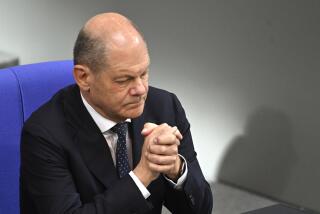Bonn Offers Aid to E. Germans for a Pledge on Reunification
- Share via
BONN — The West German government Thursday called on East Germany to make an explicit commitment to eventual German reunification in exchange for economic support.
It was the baldest statement on the subject yet by West Germany, and it came only a day after Chancellor Helmut Kohl had reassured his allies in Paris that reunification would not affect Bonn’s role in the Atlantic Alliance.
The government’s position was set forth in Parliament by Rudolf Seiters, Kohl’s specialist on East German affairs, who warned the Communist regime that such a commitment must be made after the East German elections scheduled for May 6.
Seiters referred to the agreements initiated by Kohl and East German Prime Minister Hans Modrow last month in Dresden, which, when completed, will provide strong economic, financial and cultural ties between the two states.
Seiters said the agreements were “the first step toward confederative structures that should eventually end in a federation--a federal order in Germany.”
Kohl has suggested that the two states unite first in a confederation, which is ordinarily limited to military and foreign affairs, and then seek a federation, which is more comprehensive.
After the East German elections, Seiters said, “we would like a free, elected parliament in East Germany to confirm . . . the goal of state unity.”
The proposal is likely to get a cool reception from East Germany’s Communist-led government, which views the treaties of cooperation as an end in themselves and not as a move toward reunification.
In Paris on Wednesday, Kohl attempted to reassure his West European partners and answer critics of the confederation proposal he put forth in November.
And he insisted that German reunification is not a matter for Germany’s European neighbors and the Soviet Union to decide.
“The men and women of both (West Germany and East Germany) must have the right and the possibility freely to resolve for themselves the question of whether they want to live as a single state or not,” he said.
Seiters on Thursday warned the Communist regime in East Berlin that “the climate in East Germany has changed (and) a new mistrust of the state leadership has arisen.”
“The West German government,” he said, “appeals to the present East German leadership to realize finally that fundamental political and economic reforms will admit no delay.”
More to Read
Sign up for Essential California
The most important California stories and recommendations in your inbox every morning.
You may occasionally receive promotional content from the Los Angeles Times.










